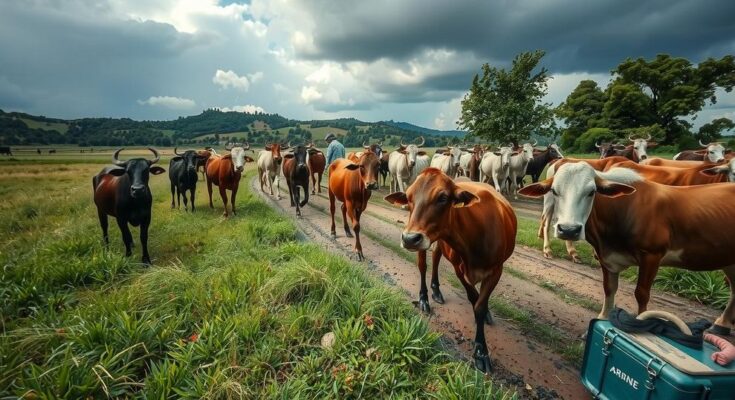Climate change has exacerbated livestock diseases along the Kenya-Uganda border, leading to conflicts among pastoralists as they seek resources in drought-stricken areas. Despite past peaceful cohabitation, increased tensions arise from competition for diminishing resources and opportunistic bandit attacks amidst growing health challenges. Regional leaders are advocating for collaborative health interventions and improved resource-sharing agreements to ensure sustainable pastoralism and regional stability.
The escalation of climate change has significantly impacted livestock health, causing spikes in transboundary animal diseases along the Kenya-Uganda border. Since 1973, when the Turkana and Matheniko pastoral communities declared peace by burying weapons of war, the border region has seen mostly harmonious cross-border interactions. However, recent prolonged droughts leading to pasture and water shortages, particularly in Turkana, have compelled pastoralists to migrate to the Karamoja region of Uganda, resulting in tensions and conflict due to opportunistic attacks by armed bandits. Herders are increasingly concerned about the proliferation of contagious livestock diseases, exacerbated by climate change-induced environmental stresses. Mr. Korobe Ngasike, a livestock keeper, articulated the perilous conditions, stating that their pursuit of grazing lands has pushed them into areas already burdened by diseases such as Peste des Petits Ruminants and trypanosomiasis, linked to tsetse flies. Historical patterns of raiding to replace lost livestock are now overshadowed by fears of disease, reflecting a shift in pastoralist strategies. During the 51st Lokiriama Peace Accord commemorations, community leaders underscored the necessity for joint health interventions for both livestock and humans, promoting sustainable pastoralism and enhancing coexistence between communities. Mr. Joseph Areng, a peacebuilding officer, emphasized the importance of collaboration in health programs and policy formulation for equitable resource use. The concerns of livestock dying due to disease and lack of support indicate an urgent need for improved veterinary services and infrastructural development. Regional leaders, including Turkana Governor Jeremiah Lomorukai and Uganda’s Minister for Karamoja Affairs, Peter Lokeris, reiterated the importance of joint efforts to tackle these challenges. The Governor highlighted the requirement for collaborative agreements, such as the Memorandum of Understanding and Resource Sharing Agreements, which are envisioned as pivotal for the region’s socio-economic development. He cautioned that conflicts could negate the progress made and impede resource utilization, urging for enhanced cooperation and community integration to strengthen ties across the nations.
The article discusses the ramifications of climate change on livestock health along the Kenya-Uganda border. Transboundary animal diseases present significant risks, as they can quickly spread across borders and have dire socio-economic and health consequences. Pastoral communities, traditionally known for their mobility in search of grazing lands, are increasingly facing challenges due to droughts, making their livelihoods precarious. The history of relative peace in the region is being threatened by both environmental changes and the actions of armed groups, necessitating coordinated responses from communities and governments to ensure both animal and human health.
In conclusion, the interplay between climate change and livestock disease management is a significant concern for communities along the Kenya-Uganda border. Cooperative efforts and policy formulations are required to mitigate the spread of diseases, improve livestock conditions, and preserve the peace established in the region. By fostering joint health initiatives and infrastructure improvements, local leaders aim to ensure the sustainability of pastoral livelihoods and enhance the security and well-being of border communities.
Original Source: nation.africa




